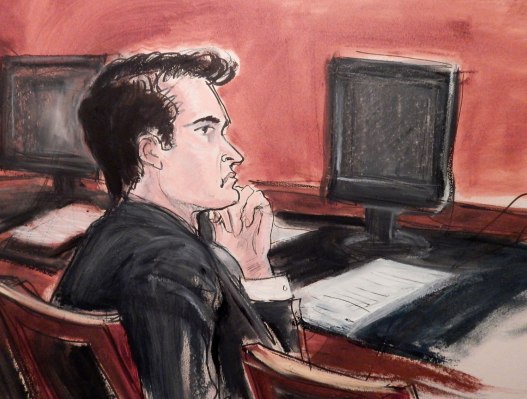Editor’s Note: John Bush is the Editor in Chief of the Liberty Beat daily radio news service and host of the weekly Bitcoin podcast SovereignBTC.
The third week of the Ross Ulbricht trial resumes today, which presents an opportunity to caught up with what happened in the case since our last installment.
To recap, Ulbricht is accused of creating the Silk Road marketplace and facilitating the sale and acquisition of drugs and other illegal goods on the site.
Proceedings in week two began with a major ruling about what is and is not admissible as evidence in court and ended with one of Ulbricht’s college friends testifying against him under pressure from the Government. Also presented last week was the contents of Ulbricht’s seized computer which included detailed logs of Silk Road administrative activities and chat logs between Dread Pirate Roberts, Silk Road’s main administrator, and his associates.
The Karpeles Conspiracy Goes Down the Memory Hole
Proceedings in the fourth day of the Ross Ulbricht Trial picked up on Tuesday, after a break for Martin Luther King Day. The first order of business was to hear Judge Katherine Forrest’s decision whether or not to allow testimony about Mark Karpeles being an early suspect in the Silk Road investigation. Judge Katherine Forrest ruled that any speculative statements or opinions about who may or may not have been Dread Pirate Roberts would not be allowed in future testimony and that previous testimony would be stricken from the record. Judge Forrest expressed that statements about Karpeles or Ulbricht being Dread Pirate Roberts that are not rooted in presentable fact would be prohibited.
This dealt a major setback to the defense as their cross-examination of Special Agent Jared Der-Yeghiayan about his suspicion that Mark Karpeles was Dread Pirate Roberts seemed to have had a major impact on the jury. While they won’t be able to forget what they heard, it will no longer be presented in the record for review.
The Contents of Ulbricht’s Computer Revealed
In week two the jury heard from the Government’s second witness, FBI computer specialist, Tom Kiernan. Agent Kiernan, who led the October 31st arrest of Ulbricht and was the first investigator to view the defendant’s computer, described to the jury screenshots obtained from the seized laptop. Among the most hard hitting evidence presented was a detailed journal of Silk Road administrative activities along with what appeared to be a complete log of TOR Chats between Dread Pirate Roberts and his associates.
With the Defense claiming Ulbricht only had control over the site for the first few months of it’s operation, they have a difficult road ahead of them in explaining the presence of Silk Road related documents and chat logs that span the life of the site on Ulbricht’s computer. When Dratel took the floor for corss-examination, his first task was overcoming the compelling evidence that had just been presented.
Sowing Seeds of Doubt
Defense Attorney Joshua Dratel’s cross-examination of Agent Kiernan focused on putting the idea in to the jury’s minds that the files found on Ulbricht’s computer related to Silk Road activities, may have been planted there by an external source. As referenced in the Defense’s opening statements, Ulbricht is an “innocent” and “naive” young man who was setup to be the “fall guy” by the real operators of Silk Road. To further this narrative, Dratel on numerous occasions referenced BitTorrent, a peer to peer file sharing program, that was running on Ulbricht’s computer at the time of his arrest. The implication is that BitTorrent may have given hackers access to Ulbricht’s computer. It isn’t clear yet if this argument will create enough doubt with the jury for them to acquit Ulbricht.
Ross’ Friend Sells Him Out
To close down the week’s proceedings, the Government called Ulbricht’s college friend and Ebay programmer, Richard Bates. Bates played a major role in assisting Ulbricht with server and programming issues he was having early on in the Silk Road’s development. According to Bates, he was kept in the dark about what Ulbricht repeatedly referred to as a “secret project”. Not wanting to help with an unknown project any longer, Bates insisted Ulbricht reveal the nature of the site. Ulbricht did just that one evening at Bates’ home. Bates testified that the two of them logged on the to Silk Road site through a neighbor’s wireless router. Upon learning more about Silk Road, Bates told Ulbricht to stop asking him for help and to quit bringing up Silk Road entirely. According the Government, Bates’ disapproval was too little to late. It was later revealed through Dratel’s cross-examination that Bates was compelled to testify after being threatened with an indictment for many of the same crimes Ulbricht is alleged to have committed.
The Pendulum Swings….
After a strong finish last week on behalf of the Defense, the momentum appears to have shifted back to the side of the Prosecution. With a mountain of evidence standing in front of them, Dratel and his team will continue to poke holes in the Government’s story, question the credibility of Government witnesses, and further their argument that Ulbricht gave up Silk Road just months after it was created. This week the State picks up with more testimony attempting to tie Ross Ulbricht to Dread Pirate Roberts along with witnesses who were arrested after having used Silk Road to buy and sell drugs.
